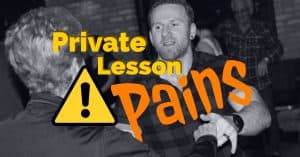 No matter your level, when it comes to dance instruction, nothing gives you more bang-for-your-buck than private lessons. Private lessons are a part of a balanced dance diet. The one-on-one feedback fills your bucket with encouragement and homework to last you a few weeks to a few months of social dance practice.
No matter your level, when it comes to dance instruction, nothing gives you more bang-for-your-buck than private lessons. Private lessons are a part of a balanced dance diet. The one-on-one feedback fills your bucket with encouragement and homework to last you a few weeks to a few months of social dance practice.
BUT, there are some ways you can unknowingly sabotage your own private lesson effectiveness. By committing these “errors”, not only are you not maximizing your value of the lesson, you might also be disrespecting the teacher, which may cause them to avoid you in the future.
Every teacher has their own way of managing their private lessons, and your local teachers will operate differently in their studio than Pros will at events. It’s important to be aware and respect the procedures, protocol, and expectations for each private lesson depending on the teacher, venue, and situation.
Don’t get me wrong: I thrive on teaching private lessons. It is definitely a highlight of my day, and I can count on one hand the number of private lessons that I have not thoroughly enjoyed. (Look for an anecdote of one of these at the end of this article). But it’s the non-dance habits or behaviour that create obstacles to learning. You could think of this article as “growing pains of private lessons” if you want, but I was intending on sharing “how not to be a pain”, “how to make private lessons less painful”, and “it pains me as a teacher to see students who…” dancing nonwithstanding.
Awkward assumptions
Assuming your teacher will accept a cheque or Paypal, or have change for cash
Especially with all the international currencies nowadays, you need to ask each teacher their preference.
Assuming you can video record the whole lesson
Some will allow it, some won’t. Myles doesn’t mind, but I personally would rather focus on you than worry about whether or not I’m in the shot.
Assuming the pros are not interested or you are not worthy
Most teachers would love to work with you because they want to help. Level should not make a difference. Here’s a whole article on this topic:
 Assuming all pros teach the same method/format/operations
Assuming all pros teach the same method/format/operations
Even teachers who received similar dance training will have different styles of communication and pedagogical training, resulting in no two teachers ever teaching the same.
Assuming you will have a room all to yourself
This *might* be possible in your small local studio, but larger studios and convention spaces are always shared.
Assuming pros are available all hours of the day
Some like to teach late at night or early mornings, but everyone’s different. We only teach between 10am and 9pm.
Learning Lemons
Not being open to new concepts
The definition of insanity is repeating the same thing over and over and expecting a different result. Always be on the hunt for fresh ideas, open to trying new things, and thinking critically about what you have learned so far, because the next upgrade is always on the horizon.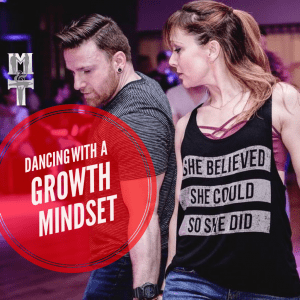
Not asking or answering questions
The teacher should not be the only one talking the whole lesson. Your questions serve to guide the teacher by indicating your learning status in that moment. If you don’t ask, the teacher is less able to tailor their material to your needs. Same with answering questions. The more you can paraphrase the teacher for confirmation and extension, the more powerful your learning will be.
Not clarifying or ensuring you understand the concept before the end of the lesson
Lessons can be overwhelming, but if you are confused, speak up in the moment. If you lie and say you understand it when you really don’t, the teacher will move forward and you’ll have missed a key piece of the puzzle. The worst thing you can do is just say “uh-huh” in order to inauthentically add another item to your advice shopping list. You won’t make significant improvement by simply collecting data from various instructors: you need to be interactive, take initiative, and process that data.
Underestimating the value of the technique coaching
Brushing off valuable technique in favor of style is a wasted opportunity. I would love to provide students with styling that they are developmentally ready for. But if they do not have the foundations in place to support the style I add, there’s no point. Understand that what you *think* you need may be style, but the obstacle in your way is lack of technique. And all teachers want to help you get there.
Offering excuses
When the teacher brings up a certain technique, make an effort to try it on before convincing yourself you can’t do it. The teacher had a good reason for prescribing this technique to you, and they wouldn’t waste your time if it wasn’t worth it. By making excuses why you “can’t” do the technique, you are rejecting their advice before even trying it out, which is disrespectful. If you have an obstacle you would like their advice in working around, go ahead and ask. But be coachable; offer no excuses.
Only learning from one teacher
There is value in consistency, but this does not preclude the value of diversifying your education. Get training from multiple sources. Check to make sure you haven’t neglected leaders or followers: have you been taking lessons from all male teachers recently? Time to mix it up.
Dummy disappointment
Assuming you don’t need a dance dummy
Most teachers know how to both lead and follow, but there are other reasons to use a dummy. The teacher will be able to observe, from an outside perspective, habits and issues that are not detectable when dancing with you. Some teachers prefer a dance dummy in order to manage their own physical output.
Being a despondent dance dummy
Take advantage of this “free” information! Be an active participant, attentive and ready. No sitting down, distracted on your phone or chatting with others in the room.
 Being a needy dance dummy
Being a needy dance dummy
Remember your role as dummy is to do as you are asked to serve the student who’s paying for it. Keep your opinions, emotions, and personal questions to yourself, unless you are invited to offer feedback or asked to correct something.
Squabbling during the lesson
This typically only happens between partners or couples. Try your best not to waste time by keeping your personal conflict out of the lesson. “Think business” for the duration of the lesson, listen carefully and “bookmark” issues to squabble over later.
Booking blunders (at events)
Assuming your schedule is more fixed and busier than a pros
Pros’ schedules vary between events, but more often than not are absolutely packed. Every hour of our 18-hour day is spoken for. Private lessons usually end up being the last priority on the schedule, after judging, competing, and workshops, which means our time is extremely limited. Your schedule might seem full, but it is full of optional items, while ours is full of contracted items.
Waiting to book until the weekend starts
Because our schedule is so packed, our availability is limited. I personally keep a list of people who have requested a private lesson in advance. First come, first booked. My schedule usually fills up before I pack my suitcase. So if you wait until Friday night to ask for a lesson, your chances we will be available are pretty slim. So don’t wait! Think about it and plan ahead like you plan your flight, hotel room, and event pass.
Asking for a lesson the night before, drunk
I’m really glad to have inspired someone to feel the urge to take a lesson ASAP. However, when someone drunk asks me at 3am Saturday night if I have any spots open on Sunday morning, I have to laugh. Not only is it way too late for me to arrange my evening to wake up early enough for a lesson before the rest of my duties, but this drunk person is not likely to even remember this booking, let alone show up to the morning lesson.
Not being flexible to accommodate event schedule changes
Event schedules are estimates and are subject to change! It’s important to be flexible and understanding. I always try to accommodate lessons around people’s comp schedule, but it is unrealistic to block yourself unavailable for an entire afternoon just because somewhere in that timeframe you will be competing for only 15 minutes. If the pro you want only has a timeslot available between your prelims and semis, you need to make a decision on your priorities.
Booking both teachers
Some teachers teach as a couple, and some don’t. There is no standard. Myles and I actually never teach privates together except for lifts/aerials. Unless you know the Pro already, it’s a good idea to ask, because the price will be different with one instructor than two and you don’t want to be caught surprised without enough cash.
Behaviour Blemishes
Showing up drunk or hungover
This should be a no-brainer! If you know you have to wake up for a private lesson, manage your hydration and sleep the night before. One time a student was shaking his head at me like he was disagreeing with what I was saying, but when I paused to invite him to express his opinion, he bolted. Straight to the garbage can. To puke.
Arguing with the teacher
You’re going to experience lessons from a wide variety of teachers whose advice may conflict. Just because you learned it a certain way does not mean that is the only way and that the new information is “wrong”. The #1 most annoying student comment teachers hate is “But that’s not how so-and-so teaches it”. Think about the logic of that statement: if you wanted to learn it they was so-and-so teaches it, you should go take a lesson from so-and-so. It’s disrespectful and comes across as whining. A better way to address the conflicting information is to ask questions like, “How does that compare to method X?” and “Just wondering why you would recommend Y instead of X?”, and “Can you help me understand how that fits in with the method I learned?”
Feeling entitled to the instructor’s time after the lesson
During the lesson, the time belongs to you, to do with as you wish. If you need to chat, cry, or eat for 10 minutes after the clock starts ticking, that’s your perogative. But when the lesson time is up, the time now belongs to the teacher. If they don’t have to rush off and are chatting afterward, that’s up to them, but please respect their need to bolt to their next appointment.
Whining and complaining
Emotions could play a factor in some lessons – maybe you are disappointed in your dance progress, or struggling with an issue in your community. It’s ok to ask the teacher for counsel, and most are happy to listen if you need to vent or tell a story, but there comes a point where “explaining the problem” goes on too long and monopolizes the lesson. When the topic becomes saturated, you’re losing dance feedback time.
Cancelling repeatedly or no-show
We get it – life happens and occasionally you miss you alarm or are sick or comps run late, etc. But if you cancel a lesson on short notice, the teacher can’t fill your spot. Which not only makes them lose income, but also prevents another keen student on their waiting list from getting a valuable learning opportunity. No-shows are even more heinous: if you don’t have an amazing excuse, I recommend finding out what the teacher’s favourite drink and dessert is, cuz that’s what it’ll take to get back in their good books.
Misconstruing the student-teacher relationship
It’s possible to have a crush on a teacher, but private lessons are their place of business, so conduct yourself accordingly. That being said, in the rare circumstance where a teacher might be crossing personal boundaries and being unprofessional, be forthright with your intentions, limits, and expectations. If they do not respect them, disassociate from them or seek help if necessary.
Irresponsible investment
 Not taking notes or video
Not taking notes or video
Never in my career has a student walked away from my lesson without notes or video. Once in a while I get someone who declines my offer to pause for notes, saying, “Nah, I’ll remember”. They usually last about 60% through the lesson, then they stop me as take me up on my offer.

Notes are not just record what the teacher said, but also to record your experience of it. Write down comparisons to other advice you have in your inventory. Write down keywords and analogies the teacher used so you can recall them later.

Transpose your messy shorthand writing/typing to a permanent document if you prefer, but whichever method you choose, keep it legible and organized so it can continue to serve you.
Not reviewing your notes or video
I actually still have notes from my first private lesson with Myles! A keen student reviews his notes before social dancing and practice sessions. If you just take notes and never review them, you are more likely to inadvetently start practicing something inaccurately.
Not bothering to try the skills
I would not waste our time teaching you something you didn’t *need*. If you didn’t understand it, instead of blowing it off as unnecessary, seek clarification. Nobody expects you to absorb and synthesize the new information immediately, but you gotta at least start trying it right away while it is fresh in your mind. If you neglect this, you are very likely to encounter this exact same advice again in a future lesson, even with a different teacher.
Not practicing
Some students take lessons often enough that their private lesson serves as a practice session. But if you don’t take frequent lessons, you owe it to yourself to practice your new skills so they have a chance to become automatic. Practicing also causes new questions to pop up, as you experiment and sometimes fail at the new skill. These are the questions to bring back to your next lesson, and what helps move your dance forward.
Not admitting you received coaching
There is no glory in being auto-didactic (self-taught). It might be tempting to keep your lessons a secret and allow others to believe that you improved magically and naturally. But actually, this backfires. People are more impressed with dancers who work on their dancing. It shows respect for the dance, and a genuine interest in being a better partner. You don’t have to go shouting it on the mountaintops every lesson you take, but if anyone compliments you on your dance improvement, be honest.
Too many private lessons
If you are taking regular and frequent lessons but not doing regular and frequent social dancing, you’re not giving yourself a chance to absorb and apply the new skills you are investing in. You need balance! Here’s a great article all about it.
A Personal Anecdote
Years ago, it was one of those rare large events that books privates on behalf of the pros (not our preference). Myles and I were booked for a lesson together with a name we did not recognize. We showed up and a man wearing a convenience-store t-shirt with giant a picture of a wolf on it, presented himself as our student – no partner, no dance dummy. We thought this strange, but continued with the lesson. After a while, we noticed a pattern: every time Myles would give him advice, he would listen attentively as he tried it dancing with me. But every time I spoke, he quickly brushed me off and redirected his question to Myles. We realized the reason he booked both of us was so he could use me as an expensive dance dummy. He was not interested in and did not value my opinion or advice at all. OH HELL NO. I was seething by the end of that lesson with this disrespectful misogynist. “WolfMan” earned himself a place on our (extremely short) blacklist. Myles and I don’t teach privates together any more.
Further Reading
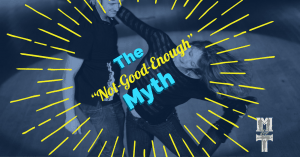
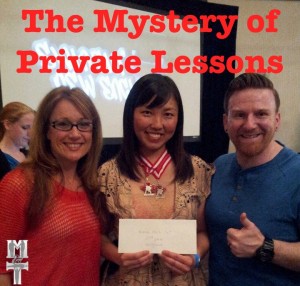
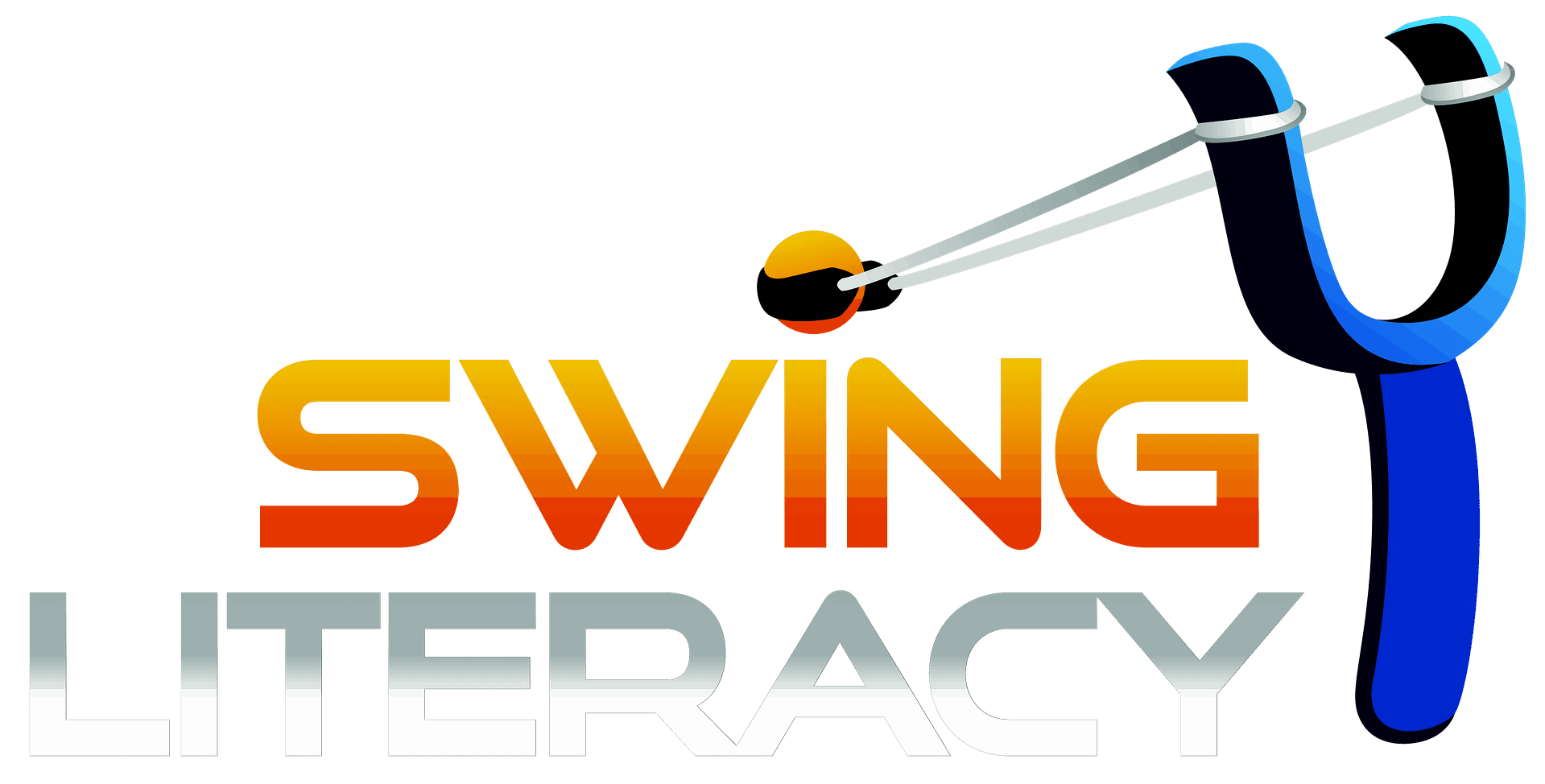
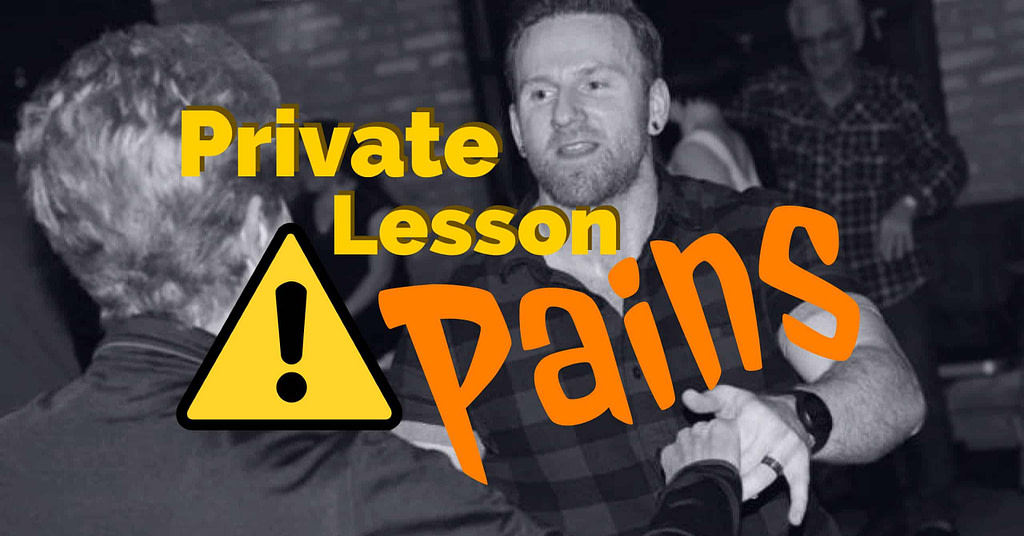








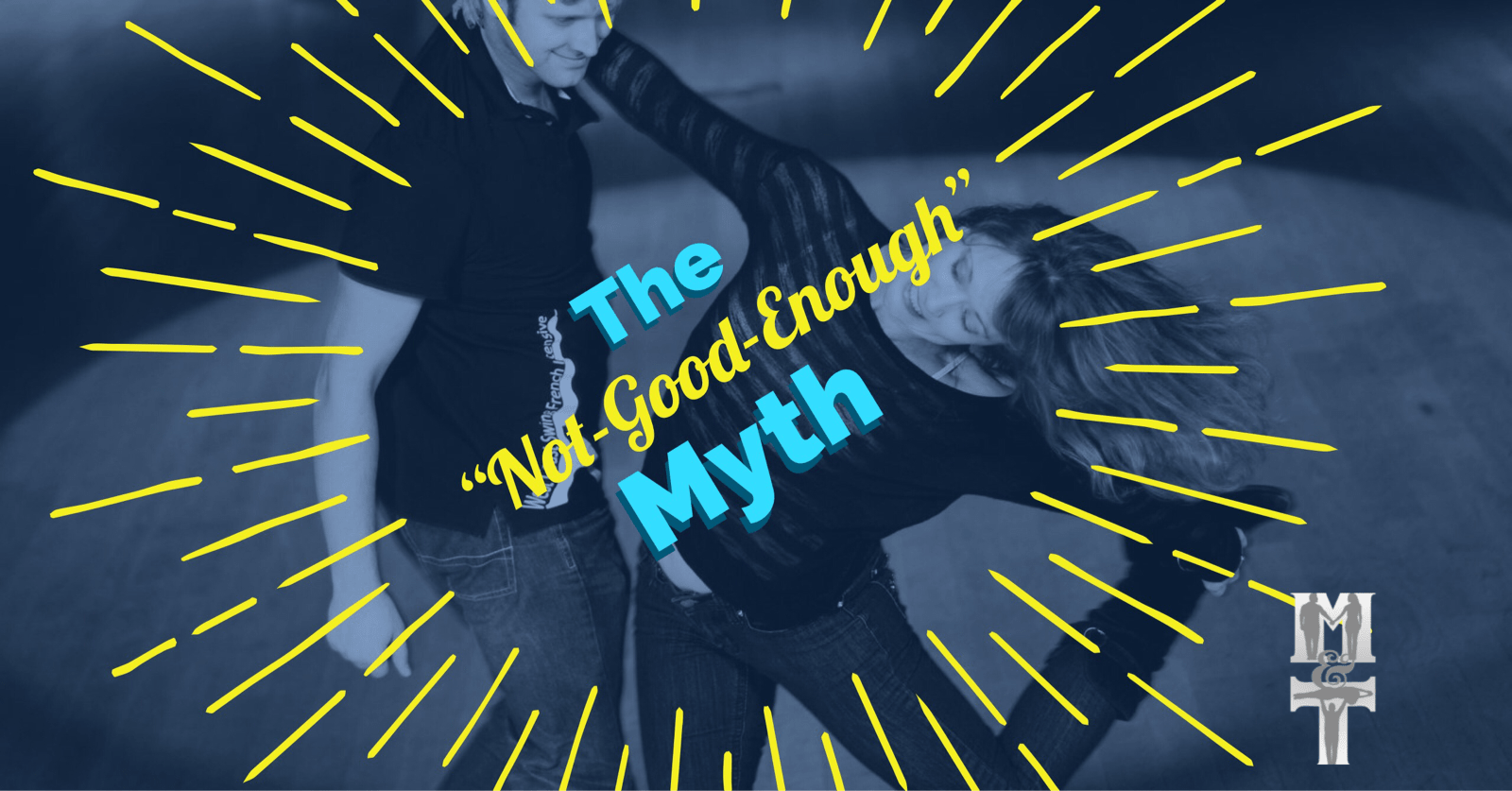
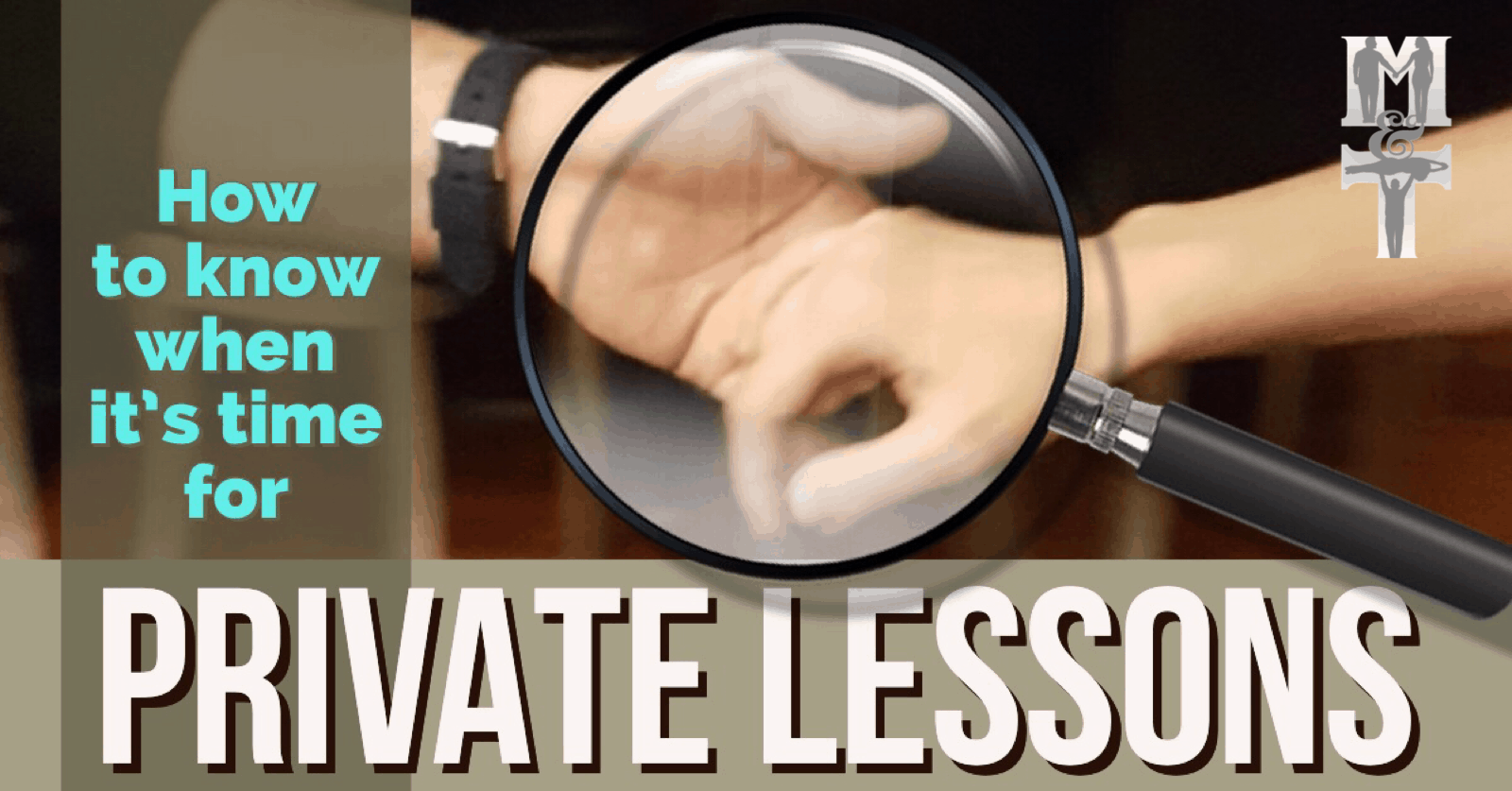
 No matter your level, when it comes to dance instruction, nothing gives you more bang-for-your-buck than private lessons. Private lessons are a part of a balanced dance diet. The one-on-one feedback fills your bucket with encouragement and homework to last you a few weeks to a few months of social dance practice.
No matter your level, when it comes to dance instruction, nothing gives you more bang-for-your-buck than private lessons. Private lessons are a part of a balanced dance diet. The one-on-one feedback fills your bucket with encouragement and homework to last you a few weeks to a few months of social dance practice.

 Being a needy dance dummy
Being a needy dance dummy
 Not taking notes or video
Not taking notes or video



